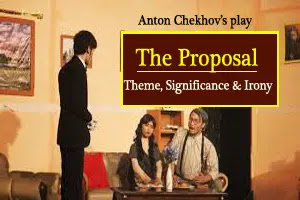Title: "The Proposal" (Play) - Summary and Critical Appreciation
Summary:
"The Proposal" is a one-act play written by Anton Chekhov. The play unfolds in the home of Stepan Stepanovich Chubukov, a landowner in rural Russia. The story revolves around the comedic misadventures of Ivan Vassiliyitch Lomov, a nervous and hypochondriac suitor, as he seeks the hand of Chubukov's daughter, Natalya.
Lomov visits Chubukov's estate with the intention of proposing to Natalya, despite his constant bouts of anxiety and indecisiveness. However, as Lomov engages in a conversation with Natalya, a trivial argument erupts regarding a disputed piece of land. The argument escalates to the point where Lomov collapses due to a supposed heart attack.
Amidst the chaos, Chubukov, worried about his daughter's reputation, urges Lomov and Natalya to make up and agree to marry each other. Despite their ongoing disagreement, Lomov and Natalya finally agree to the proposal, only to argue about the exact terms of their agreement.
The play concludes with the characters in a state of confusion and frustration, symbolizing the absurdity of their petty conflicts and highlighting the themes of societal expectations and the fragility of human relationships.
Critical Appreciation:
"The Proposal" is a satirical play that showcases Anton Chekhov's mastery of comedic dialogue and the ability to expose the flaws and idiosyncrasies of human nature. Through sharp wit and irony, Chekhov offers a scathing commentary on societal expectations, petty disputes, and the absurdity of human behavior.
One of the notable elements of the play is Chekhov's skillful use of comedic timing and verbal sparring. The rapid-fire exchanges between the characters generate laughter and highlight the trivial nature of their arguments. Chekhov's clever wordplay and subtle sarcasm add depth to the comedic elements, making it an entertaining and engaging read.
Furthermore, "The Proposal" serves as a social critique, exposing the conventions and expectations of Russian society during that time. The play reflects the pressure placed on individuals to conform to societal norms, as seen in Chubukov's urgency to marry off his daughter and Lomov's anxious pursuit of a suitable match. The exaggerated conflicts and hasty resolutions satirize the shallow nature of these social expectations.
Additionally, Chekhov uses the play to explore the fragility of human relationships. The constant bickering and inability to communicate effectively between Lomov and Natalya illustrate the triviality of their dispute and the superficiality of their connection. This theme raises questions about the nature of love, the complexities of human interactions, and the fickle nature of romantic relationships.
In conclusion, "The Proposal" is a comedic and satirical play that offers a humorous critique of societal expectations and human relationships. Chekhov's masterful writing and insightful observations make it a compelling exploration of the absurdities and trivialities of everyday life.
Now, as requested, here are ten multiple-choice questions (MCQs) related to the play:
1. Who is the nervous suitor in "The Proposal"?
a) Stepan Stepanovich Chubukov
b) Ivan Vassiliyitch Lomov
c) Natalya
d) Anton Chekhov
2. Where does the play "The Proposal" take place?
a) A city apartment
b) A country estate
c) A theater
d) A restaurant
3. What is the main conflict in the play?
a) A dispute over a piece of land
b) A family
feud
c) A disagreement about marriage customs
d) A clash of social classes
4. What happens when Lomov engages in an argument with Natalya?
a) They fall in love.
b) Lomov proposes to her.
c) Lomov collapses with a heart attack.
d) Natalya confesses her secret love for Lomov.
5. Why does Chubukov urge Lomov and Natalya to reconcile?
a) He wants a peaceful household.
b) He wants them to marry for financial gain.
c) He is concerned about Natalya's reputation.
d) He dislikes conflict.
6. What does the play satirize?
a) Human relationships and societal expectations
b) Political corruption
c) Religious institutions
d) Technological advancements
7. What is the tone of "The Proposal"?
a) Tragic and melancholic
b) Romantic and sentimental
c) Comedic and satirical
d) Serious and contemplative
8. What theme does the play explore?
a) The importance of family bonds
b) The pursuit of wealth and power
c) The complexities of love and marriage
d) The consequences of war and violence
9. How does Chekhov use humor in the play?
a) Through physical comedy and slapstick
b) Through witty dialogue and verbal sparring
c) Through dark and morbid jokes
d) Through sarcastic remarks and insults
10. What does the ending of the play symbolize?
a) The triumph of true love
b) The resolution of conflicts
c) The absurdity of human disputes
d) The inevitability of societal expectations
(Note: The correct answers are: 1.b, 2.b, 3.a, 4.c, 5.c, 6.a, 7.c, 8.c, 9.b, 10.c)





No comments:
Post a Comment